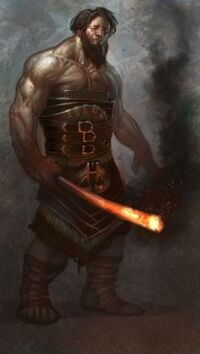Hephaestus (Ήφαιστος in Ancient Greek, also spelled Hephaistos) is the god of technology, blacksmiths, craftsmen, artisans, sculptors, metals, metallurgy, fire and volcanoes. Hephaestus' Roman equivalent was Vulcan. In Greek mythology, Hephaestus was the son of Zeus and Hera, the King and Queen of the Gods.
As a smithing god, Hephaestus made all the weapons of the gods in Olympus. He served as the blacksmith of the gods, and was worshipped in the manufacturing and industrial centres of Greece, particularly Athens. The cult of Hephaestus was based in Lemnos. Hephaestus's symbols are a smith's hammer, anvil, and a pair of tongs.
Hephaestus had his own palace on Olympus, containing his workshop with anvil and twenty bellows that worked at his bidding. Hephaestus crafted much of the magnificent equipment of the gods, and almost any finely-wrought metalwork imbued with powers that appears in Greek myth is said to have been forged by Hephaestus. He designed Hermes' winged helmet and sandals, the Aegis breastplate, Aphrodite's famed girdle, Agamemnon's staff of office, Achilles' armor, Heracles' bronze clappers, Helios' chariot, the shoulder of Pelops, and Eros' bow and arrows. In later accounts, Hephaestus worked with the help of the chthonic Cyclopes—among them his assistants in the forge, Brontes, Steropes and Pyracmon.
Hephaestus also built automatons of metal to work for him. This included tripods that walked to and from Mount Olympus. He gave to the blinded Orion his apprentice Cedalion as a guide. Prometheus stole the fire that he gave to man from Hephaestus's forge. Hephaestus also created the gift that the gods gave to man, the woman Pandora and her pithos. Being a skilled blacksmith, Hephaestus created all the thrones in the Palace of Olympus.




